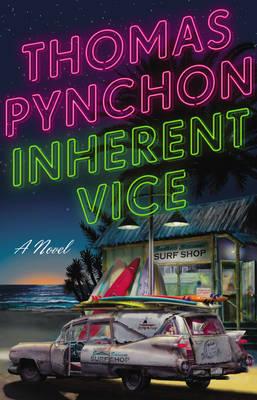ISBN: 9780224089487
Date read: 15/04/2021
How strongly I recommend it: 10/10
Support your local bookshop by going to Bookshop.org to buy your copy (instead of THAT online shopping website…)
It’s 1970. Gordita Beach, Los Angeles. Nixon is president, The Manson Family is on trial and Larry ‘Doc’ Sportello is a private detective who’s just had a visit from his ex-girlfriend, one Shasta Fey Hepworth, who asks him to investigate a possible plot to kidnap her boyfriend Mickey Wolfmann, a billionaire land developer. Before he knows it, Doc is plunged into a tangled web of characters, including, but not limited to, an LAPD detective with a penchant for kicking in doors (and who moonlights as an actor), a predatory dentist that may be a member of an international heroin smuggling syndicate, an ex-con neo-Nazi biker with a swastika tattoo on his head and a tenor sax player who might not be quite as dead as everyone thinks he is. If this all seems a little confusing, don’t worry. It’s supposed to be.
Even as a big fan, Pynchon is tough to recommend to most casual readers. In literary and academic circles, Pynchon’s novels are known for being vast, complex and encyclopedic affairs, with hundreds of characters and structures that, for most people, requiring a reader’s guide just to make sense of what’s going on. And that’s not to mention the myriad of cultural, historical and linguistic references layered on top of all that. The most famous of these is his 1973 novel Gravity’s Rainbow, for which he won the 1974 National Book Award and which is often likened to Moby-Dick and Ulysses in both its complexity and importance to literature. However, it was also called ‘unreadable,’ ‘turgid,’ ‘overwritten’ and ‘obscene’ by the Pulitzer Prize Advisory Board, who were offended by the novel’s content. Needless to say no Pulitzer was awarded that year.
This is partly what makes Inherent Vice so special in comparison to Pynchon’s previous work; you really do get the best of both worlds. Doc’s sandy, marijuana-fueled investigation is a brilliant slice of hard-boiled (or perhaps in Doc’s case, fried) detective fiction, but still loaded with big ideas about America, counterculture and the end of a very special era to millions of people.
All of the Pynchon hallmarks are here, but extremely polished and refined. The silly names, acronyms, songs and puns (none of which I’m going to spoil here) are laugh-out-loud funny, a claim not many so-called ‘comedy’ books can actually make. What makes Inherent Vice so incredible is that it packs such a literary punch and balances it expertly with low comedy and stoner humor, without losing any of Pynchon’s literary weight. He expertly uses Doc’s encounters and stoner high-jinx as a vehicle to deliver what is one of the best invocations of a specific time and place in all of literature, told by a master who was actually there:
‘It was late winter in Gordita, though for sure not the usual weather. You heard people muttering to the effect that last summer the beach didn’t have summer till August, and now there probably wouldn’t be any winter till spring. Santa Anas had been blowing all the smog out of downtown L.A… with the exhaust from millions of motor vehicles mixing with microfine Mojave sand to refract the light toward the bloody end of the spectrum, everything dim, lurid and biblical, sailor-take-warning skies. The state liquor stamps over the tops of tequila bottles in the stores were coming unstuck, is how dry the air was.’[1]
Also check out this section:
‘Back at the beach, the rain continued, and every day up in the hills, another fragment of real estate came sliding down…The termitic houses of Gordita Beach had all turned to the consistency of wet sponge, emergency plumbers reached in to squeeze the beams and joists, thinking of their own winter homes in Palm Springs. People began to go crazy even while on the natch. Some enthusiast, claiming to be George Harrison of the Beatles, tried to hijack the Goodyear Blimp, moored at its winter quarters at the intersection of the Harbor and San Diego Freeways, and make it fly him to Aspen, Colorado, in the rain.’[2]
The places, the people, the intertwining of this fictional suburb with real world events. It all paints a beautiful picture of what it was like to be in seventies California. And the whole book is like this. It’s just one magical passage after another. Wherever Doc goes, you’ll feel as if you are there with him. An old criticism levelled at Pynchon in the past has been that his characters can come across as flat, functioning as no more than mouths on sticks. Not so here. You’ll grow to love Doc, with his stoner wit and hippy wisdom, his kind nature and determination to do the right thing in any given situation. He’s the closest thing to a real hero that Pynchon has ever written. The villains in the text are also brilliantly hate-able, and will have you seething with anger or biting your nails in fear for Doc’s safety.
For anyone that has yet to experience Thomas Pynchon, this novel is the place to start. For any reader not sure about what to read next, go and get a copy of Inherent Vice. Immediately. You won’t regret it.
[1] Thomas Pynchon, Inherent Vice, (London: Vintage, 2009) p. 98
[2] Ibid, p. 166
